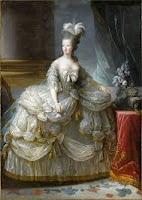Marie Antoinette (1755 – 1793)
Marie Antoinette was born in Vienna, Austria in 1755. She was the fifteenth child of the Holy Roman Emperor Francis I and Empress Maria Theresa. Marie Antoinette was known for her beauty and charming personality. She was married at the age of 14 to the Dauphin of France, Louis-Auguste. He would later become King Louis XVI.
Marie Antoinette’s marriage to Louis-Auguste was arranged as part of a political alliance between France and Austria. Her arrival in France was met with great fanfare, but the French people were initially wary of her because of her foreign origin. She struggled to fit in with the French court and was criticized for her extravagant spending habits, which earned her the nickname "Madame Deficit".
Marie Antoinette’s reputation suffered greatly during the French Revolution. She was accused of being out of touch with the needs of the French people and of spending vast sums of money on frivolous pursuits, such as gambling and clothing. She was also accused of having an affair with a Swedish count, Axel von Fersen.
Marie Antoinette's role in the French Revolution is controversial. Some historians argue that she played a significant role in the collapse of the French monarchy by supporting her husband's conservative policies and resisting reforms. Others argue that she was a victim of circumstance, trapped in a system that did not allow her to make meaningful political decisions.
In 1792, the French monarchy was overthrown and Louis XVI was executed. Marie Antoinette was imprisoned with her children in the Temple prison in Paris. She was later transferred to the Conciergerie, where she awaited trial.
Marie Antoinette's trial was a sham. She was not allowed legal representation, and the judges were biased against her. She was accused of a range of crimes, including treason, conspiracy, and sexual depravity. The evidence against her was weak, but she was found guilty and sentenced to death.
On October 16, 1793, Marie Antoinette was executed by guillotine. Her death was met with shock and horror throughout Europe. She was only 37 years old.
Marie Antoinette's legacy is complex. She is remembered for her beauty, her extravagant lifestyle, and her tragic end. She has been portrayed as a cruel and callous queen who was out of touch with the needs of her people. However, she has also been seen as a victim of circumstance, trapped in a system that did not allow her to make meaningful political decisions.
Today, Marie Antoinette is often seen as a symbol of the excesses of the French monarchy and the French Revolution. She has been the subject of numerous films, books, and plays, and her image has been used in advertisements and fashion campaigns. Her famous quote, "Let them eat cake," is still remembered today as a symbol of the callousness of the ruling class.
Despite her controversial legacy, Marie Antoinette remains an iconic figure in European history. Her life and death continue to fascinate people around the world, and her story is a reminder of the power and fragility of monarchy.















No comments